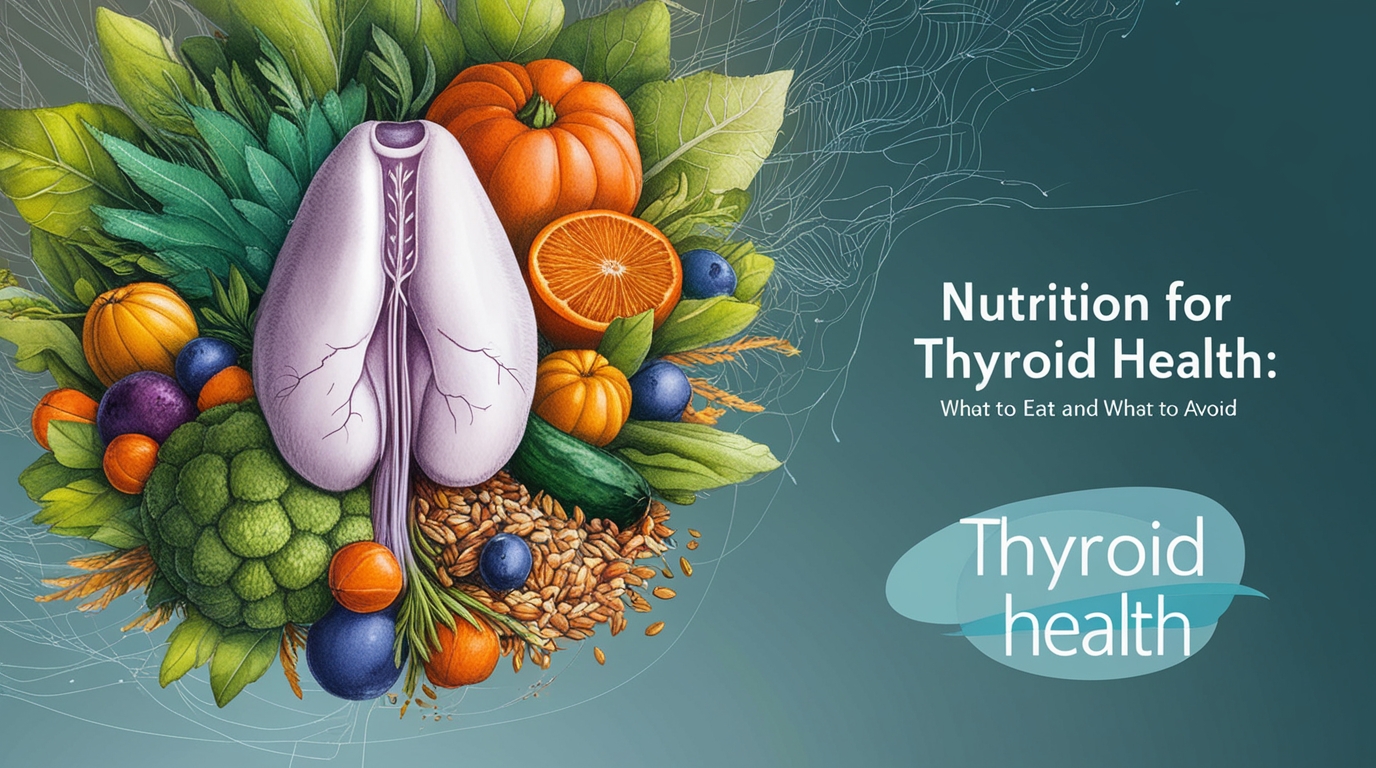Nutrition for Thyroid Health: What to Eat and What to Avoid
The thyroid is a small gland in your neck, but it has a big impact on your health. It helps control your energy, weight, and mood. When it doesn’t work well, you might feel tired, gain weight, or feel down. Many people don’t realize that what they eat can help or hurt their thyroid. Could the foods you think are healthy actually be causing problems?
In this blog, we will look at the best foods to support your thyroid, which ones to avoid, and simple tips for a diet that keeps your thyroid healthy. The choices you make can really change how you feel let’s see!!!
Enhance your thyroid health with best diet plans click here.
Understanding Thyroid Health
The thyroid is a small gland in your neck that produces hormones, mainly thyroxine (T4) and triiodothyronine (T3). These hormones affect every cell in your body. If your thyroid isn’t working right, it can cause problems like hypothyroidism (when the thyroid is underactive) or hyperthyroidism (when it’s overactive). Symptoms of hypothyroidism include tiredness, weight gain, and feeling down, while hyperthyroidism can lead to weight loss, anxiety, and a fast heartbeat.
Key Nutrients for Thyroid Health
- Iodine
- Role: Iodine is necessary for making thyroid hormones. Not getting enough can lead to a swollen thyroid (goiter) or hypothyroidism.
- Sources: You can find iodine in iodized salt, seaweed, fish, dairy products, and eggs.
- Selenium
- Role: Selenium helps turn T4 into the more active T3 and protects the thyroid from damage.
- Sources: Good sources include Brazil nuts, sunflower seeds, fish (like tuna and sardines), and eggs.
- Zinc
- Role: Zinc helps produce thyroid hormones and keeps metabolism running smoothly.
- Sources: You can get zinc from meat, shellfish, legumes, seeds, nuts, and whole grains.
- Vitamin D
- Role: Vitamin D is important for your immune system and may help with thyroid function.
- Sources: The best source is sunlight, but you can also find it in fortified foods, fatty fish, and egg yolks.
- Omega-3 Fatty Acids
- Role: Omega-3s reduce inflammation and support thyroid health.
- Sources: Fatty fish (like salmon and mackerel), flaxseeds, chia seeds, and walnuts are rich in omega-3s.
Foods to Include for Thyroid Health
- Fruits and Vegetables
- Colorful fruits and vegetables are packed with vitamins and antioxidants that support thyroid health. Dark leafy greens, berries, and vegetables like broccoli and kale are especially good.
- Whole Grains
- Whole grains provide important nutrients and fiber, which help with digestion. Options include quinoa, brown rice, and oats.
- Lean Proteins
- Include lean proteins like chicken, turkey, fish, beans, and legumes to help maintain muscle and support metabolism.
- Fermented Foods
- Foods like yogurt, kefir, sauerkraut, and kimchi promote gut health, which is linked to thyroid function. A healthy tummy helps your body absorb more nutrients.
Foods to Avoid for Thyroid Health
- Goitrogenic Foods
- Goitrogens can interfere with thyroid hormone production, especially if eaten raw in large amounts. Limit raw cabbage vegetables like:
- Broccoli
- Cauliflower
- Brussels sprouts
- Kale
- Cooking these vegetables can help you to reduce their goitrogenic effects.
- Goitrogens can interfere with thyroid hormone production, especially if eaten raw in large amounts. Limit raw cabbage vegetables like:
- Processed Foods
- Highly processed foods are often high in sugars and unhealthy fats, which can negatively affect your thyroid. Try to focus on whole, natural foods.
- Soy Products
- Soy can interfere with thyroid function, especially if you don’t get enough iodine. Use soy products like curd and soy milk in moderation.
- Gluten
- Some people with thyroid problems may also have issues with gluten. If you have stomach problems, talk to your doctor about reducing gluten.
- Excessive Caffeine and Alcohol
- Too much caffeine can overstimulate the thyroid, while excessive alcohol can disrupt hormone production. Moderation is key for both.
Practical Tips for a Thyroid-Friendly Diet
- Stay Hydrated: Drink plenty of water to support your overall health and metabolism.
- Eat Regularly: Aim for balanced meals and snacks throughout the day to keep your energy levels steady.
- Consult a Healthcare Professional: If you have thyroid issues, work with a dietitian or doctor to create a personalized nutrition plan.
- Consider Supplements: If you’re not getting enough nutrients from food, ask your doctor about taking supplements, especially for iodine, selenium, or vitamin D.
Conclusion
As shown above in detail now it’s all up to you to take care of yours. By What you eat is important for keeping your thyroid healthy. By focusing on good foods and being careful about what to avoid, you can help your thyroid work better. Everyone’s needs are different, so pay attention to your body and get advice from a healthcare professional if needed.
As the saying goes, “Take care of your body; it’s the only place you have to live.” Making healthy choices today will help you feel better tomorrow. Remember, “You don’t have to be extreme, just consistent.” Small, simple changes can lead to big improvements in your health. With the right food choices, you can support your thyroid and improve your overall well-being!





